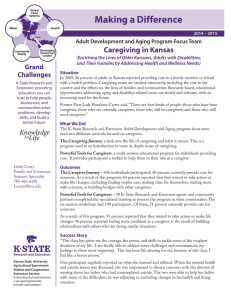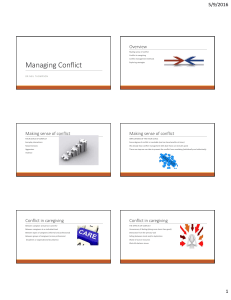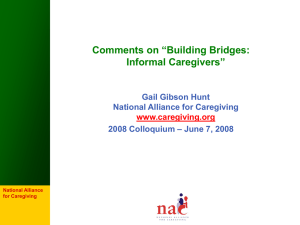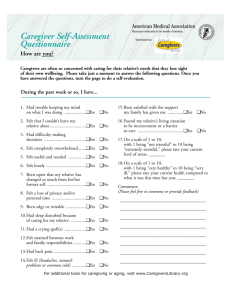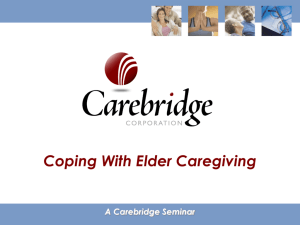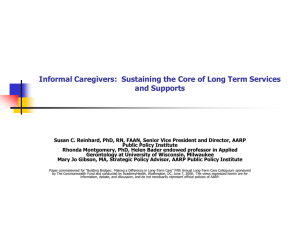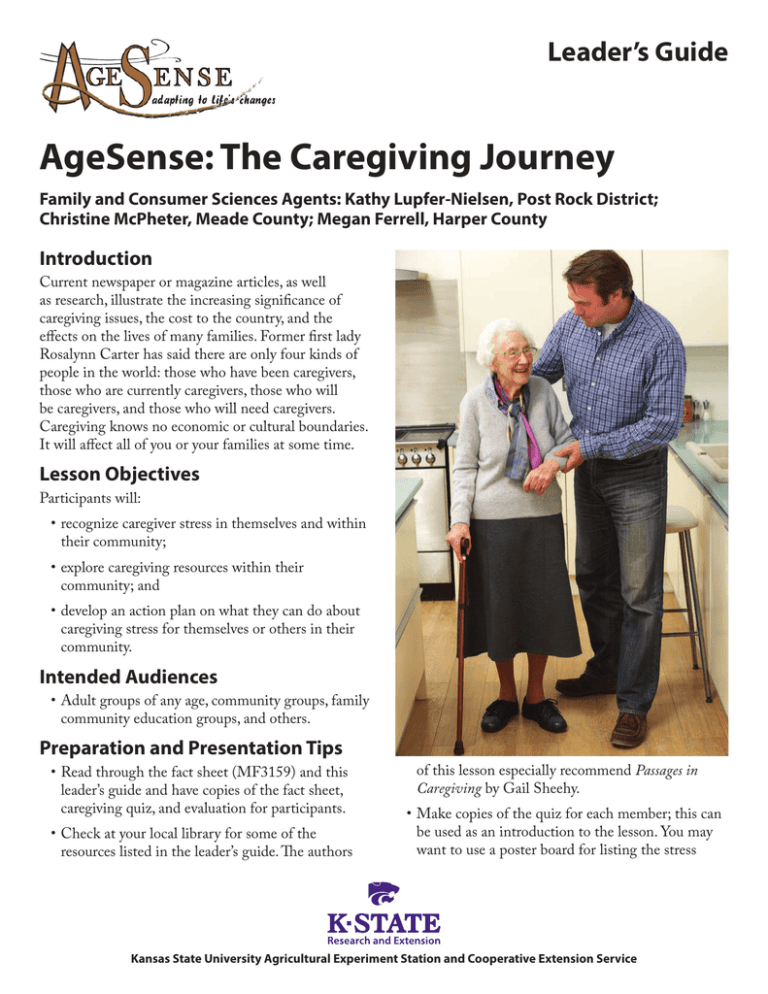
Leader’s Guide
AgeSense: The Caregiving Journey
Family and Consumer Sciences Agents: Kathy Lupfer-Nielsen, Post Rock District;
Christine McPheter, Meade County; Megan Ferrell, Harper County
Introduction
Current newspaper or magazine articles, as well
as research, illustrate the increasing significance of
caregiving issues, the cost to the country, and the
effects on the lives of many families. Former first lady
Rosalynn Carter has said there are only four kinds of
people in the world: those who have been caregivers,
those who are currently caregivers, those who will
be caregivers, and those who will need caregivers.
Caregiving knows no economic or cultural boundaries.
It will affect all of you or your families at some time.
Lesson Objectives
Participants will:
•recognize caregiver stress in themselves and within
their community;
•explore caregiving resources within their
community; and
•develop an action plan on what they can do about
caregiving stress for themselves or others in their
community.
Intended Audiences
•Adult groups of any age, community groups, family
community education groups, and others.
Preparation and Presentation Tips
•Read through the fact sheet (MF3159) and this
leader’s guide and have copies of the fact sheet,
caregiving quiz, and evaluation for participants.
•Check at your local library for some of the
resources listed in the leader’s guide. The authors
of this lesson especially recommend Passages in
Caregiving by Gail Sheehy.
•Make copies of the quiz for each member; this can
be used as an introduction to the lesson. You may
want to use a poster board for listing the stress
Kansas State University Agricultural Experiment Station and Cooperative Extension Service
relievers found in the leader’s guide. Ask group
members to add other ideas to the list.
Tools for Releasing Stress
Taking a walk
•Share action plans (page 3) with the group.
Being with children
•At the end of the lesson, your group may want to
purchase The Caregiver Helpbook or other caregiving
resources for your local library.
Watching a movie
Writing in a journal
Meditating
•If there are those in your group unfamiliar with
Internet resources, consider a tour to the library
and have a librarian show you the Alzheimer’s
or Parkinson’s support group websites. Many
communities don’t have support groups for specific
diseases, but support groups can be found online.
Music — playing the piano or singing
Playing with your pet
Get a massage or manicure
Dancing
Laughing
Sewing or crafts
Additional Activities
Yoga
November is National Family Caregivers Month. Your
group could do a community display highlighting
caregiver resources in your location. Share news
columns or articles with the community. Your group
could host a program. The theme changes from year to
year. See www.caregiver.com for more information.
Resources:
Taking leisurely, warm baths
Exercising
Praying
Visualizing a pleasant situation
Reading a book
State agencies
Kansas Department of Aging and Disability — www.
ksadrc.org/Links.html. Site has links for Kansas Area
Agencies on Aging, Association of Community
Mental Health Centers of Kansas, Veteran’s Affairs,
Kansas Attorney General, assistive technology
information, and much more.
Kansas Department of Health and Environment —
www.kdheks.gov. Find public health services across the
state on this site.
Disease specific sites:
Parkinson’s Disease — www.parkinsons.org
Brain Injury of America — www.biausa.org
Alzheimer’s Association — www.alz.org; 24/7 Helpline
800-272-3900. There are two Kansas chapters, Heart
of America in Prairie Village, Kansas, and Central and
Western Kansas Chapter in Wichita. Online tools
include Alzheimer’s Navigator, Caregivers Stress Test,
ALS Connected (message board), and e-newsletter.
American Diabetes Association — www.diabetes.org
Mental Health America — www.nmha.org
State Universities:
Kansas State Research and Extension’s aging website.
www.aging.ksu.edu
2
Deep breathing for relaxation
(From the Powerful Tools for Caregivers class script)
Kansas State University Center on Aging —
www.he.k-state.edu/aging
University of Kansas Gerontology Department —
www.gerontology.ku.edu
Wichita State University Regional Institute on Aging
— www.wichita.edu/aging
National Sites:
National Family Caregivers Association, 800/8963650 — www.thefamilycaregiver.org
Books:
The Caregiver Helpbook: Powerful Tools for Caregivers,
Legacy Caregiver Services. Portland, Oregon; email
address to order a copy is at:
www.powerfultoolsforcaregivers.org/
Passages in Caregiving, by Gail Sheehy
Today’s Caregiver — www.caregiver.com. An online
caregiver magazine with optional weekly articles
available from the National Alliance for Caregiving.
Caregiver Action Network — caregiveraction.org
National eXtension’s website with research based
information on many topics including caregiving —
www.extension.org/family_caregiving
K-State Research and Extension — AgeSense: The Caregiving Journey, Leader’s Guide
Caregiving Quiz
How much do you know about family caregivers
today? Take this quiz to learn more about the millions
of Americans who are caring for loved ones who are
frail, chronically ill or disabled.
1.How many people are currently caring for an
elderly or disabled loved one?
a. 11 million
b. 27 million
c. 65 million
2.Who said “There are only four kinds of people in
the world: those who have been caregivers; those
who are currently caregivers; those who will be
caregivers; those who will need caregivers”?
a. Rosalynn Carter
b. Mother Teresa
c. Sandra Day O’Connor
3.Serving as a family caregiver can have a negative
impact on a person’s …
a. Health
b. Emotional state
c. Career
d. All of the above
4.What is the term for the adults who are raising
children under 18 while providing care for an
elderly parent?
a. “The Sandwich Generation”
b. “Dual Responsibles”
c. “Double Duty Carers”
5.Respite care, which provides a temporary break for
caregivers…
a. Isn’t a good idea because it upsets the routine
b. Can be provided in the home
c. May be a short-term onsite program at a
nursing home
d. Both B and C
6.What percentage of family caregivers are women?
a. 44
b. 66
c. 89
d. 92
7.The Family and Medical Leave Act of 1993 allows
employees of larger companies to take a 12-week
leave if they …
a. Experience an illness
b. Give birth to or adopt a baby
c. Provide care for an ill spouse or parent
d. All of the above
8.The annual dollar value of the services provided by
family caregivers is estimated to be …
a. $800 million
b. $25 billion
c. $450 billion
9.The best way to be a good caregiver is …
a. To sacrifice everything for the loved one’s needs
b. To be sure the caregiver’s needs are also met
c. To graciously turn down offers of help
10.Help for family caregivers is available through …
a. State and federal programs
b. Volunteer groups
c. Home care agencies
d. All of the above
________________________________________
Answers to “How Much Do You Know About Family
Caregivers?” quiz: 1. C; 2. A; 3. D; 4. A; 5. D; 6. B; 7. D; 8. C; 9. B;
10. D
Used with permission of AgeWise, 2013
http://www.trinityonlaurens.org/2013/11/12/how-much-do-youknow-about-family-caregivers/
My Action Plan
This week I want to ...
What?
How much?
Time of day?
How many times?
How confident are you?
(0 = no confidence;10 = total confidence)
My Progress
Did it!
Comments
Mon
Tue
Wed
Thu
Fri
Sat
Sun
K-State Research and Extension — AgeSense: The Caregiving Journey, Leader’s Guide
3
AgeSense: The Caregiving Journey — Evaluation
ID Number: _________ (Agent Use only)
Date of Program:_______________
Program County:__________________________
Instructor:_________________________________________________________________
Thank you for you participation. To help improve this program, we would like your responses to the questions below.
Your participation is voluntary, and you do not have to respond to any questions you do not want to answer. This
information will only be used for program evaluation purposes, and you will not be identified in any way by the
information you provide.
1. Because of your participation in this program, did you learn anything new? __Yes
a. If yes, what did you learn?
__ No
2. Because of your participation in this program, do you plan on taking any action or changing anything in your life?
__Yes __ No a. If yes, what?
3. Gender: ___Female
___Male
4. Your Age: _______
5. Marital Status ( please check only one):
___Married
___Single
___Single, living with partner
___Separated or Divorced
___Prefer not to respond
6. Do you provide care for someone else? __ Yes
7.
___Widowed
__No
For the following items, please indicate your level of agreement by placing a check in the appropriate box.
Strongly
Agree
Agree
Neither Agree Disagree
or Disagree
Strongly
Disagree
Because of this program, I have more positive
feelings about caregiving.
Because of this program, I understand there
are proactive steps that I can take on my
caregiving journey.
Because of this program, I know where to go
to find more information on caregiving in my
community or via the computer.
Because of this program, I will ask family
members to help with caregiving.
This program was valuable to me.
8. Please provide any additional comments you may have.
9. May we contact you later to talk with you about this program? __ Yes __ No
If yes, please write your contact information (including email) on the back of the evaluation form. Thank you.
Thank you for completing this form. We appreciate your feedback!
Publications from Kansas State University are available at: www.ksre.ksu.edu
Publications are reviewed or revised annually by appropriate faculty to reflect
current research and practice. Date shown is that of publication or last revision.
Contents of this publication may be freely reproduced for educational purposes.
All other rights reserved. In each case, credit Kathy Lupfer-Nielsen, Christine
McPheter, Megan Ferrell, AgeSense: The Caregiving Journey, Leader’s Guide, Kansas
State University, July 2014.
Kansas State University Agricultural Experiment Station and Cooperative
Extension Service
K-State Research and Extension is an equal opportunity provider and employer.
Issued in furtherance of Cooperative Extension Work, Acts of May 8 and June
30, 1914, as amended. Kansas State University, County Extension Councils,
Extension Districts, and United States Department of Agriculture Cooperating,
John D. Floros, Director.
MF3160
July 2014

